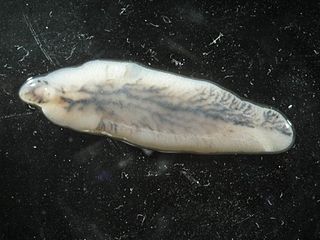Related Research Articles
The Aspidogastrea is a small group of flukes comprising about 80 species. It is a subclass of the trematoda, and sister group to the Digenea. Species range in length from approximately one millimeter to several centimeters. They are parasites of freshwater and marine molluscs and vertebrates. Maturation may occur in the mollusc or vertebrate host. None of the species has any economic importance, but the group is of very great interest to biologists because it has several characters which appear to be archaic.
Opisthorchis viverrini, common name Southeast Asian liver fluke, is a food-borne trematode parasite from the family Opisthorchiidae that infects the bile duct. People are infected after eating raw or undercooked fish. Infection with the parasite is called opisthorchiasis. O. viverrini infection also increases the risk of cholangiocarcinoma, a cancer of the bile ducts.

The red-rimmed melania, scientific name Melanoides tuberculata, is a species of freshwater snail with an operculum, a parthenogenetic, aquatic gastropod mollusk in the family Thiaridae.

Fasciolidae is a family of trematodes and includes several parasites involved in the veterinary and medical sciences. Fasciolidae is divided into five genera by Olsen et al. 2003. The family's various species are localised in liver, gall bladder, and intestine. Their life-cycle includes an intermediate host, freshwater snails from the family Lymnaeidae.

Pila is a genus of large freshwater snails with an operculum, African and Asian apple snails, aquatic gastropod mollusks in the family Ampullariidae, the apple snails.

Elimia livescens, common name the liver elimia, is a species of freshwater snail with an operculum, an aquatic gastropod mollusk in the family Pleuroceridae.

Radix rubiginosa is a species of air-breathing freshwater snail, an aquatic pulmonate gastropod in the family Lymnaeidae, the pond snails.

Freshwater snails are gastropod mollusks which live in fresh water. There are many different families. They are found throughout the world in various habitats, ranging from ephemeral pools to the largest lakes, and from small seeps and springs to major rivers. The great majority of freshwater gastropods have a shell, with very few exceptions. Some groups of snails that live in freshwater respire using gills, whereas other groups need to reach the surface to breathe air. In addition, some are amphibious and have both gills and a lung. Most feed on algae, but many are detritivores and some are filter feeders.

Bithynia siamensis is a species of a freshwater snail with a gill and an operculum, an aquatic prosobranch gastropod mollusk in the family Bithyniidae.

Indoplanorbis is a genus of air-breathing freshwater snail. Its only member species is Indoplanorbis exustus, an aquatic pulmonate gastropod mollusk in the family Planorbidae, the ram's horn snails. The species is widely distributed across the tropics. It serves as an important intermediate host for several trematode parasites. The invasive nature and ecological tolerance of Indoplanorbis exustus add to its importance in veterinary and medical science.
Spirorchiidae is a family of digenetic trematodes. Infestation by these trematodes leads to the disease spirorchiidiosis. Spirorchiids are mainly parasites of turtles. It has been synonymised with Proparorchiidae Ward, 1921, Spirorchidae Stunkard, 1921, and Spirorchiidae MacCallum, 1921.

Filopaludina martensi is a species of large freshwater snail with a gill and an operculum, an aquatic gastropod mollusk in the family Viviparidae.

Gabbia erawanensis is a species of freshwater snail with a gill and an operculum, an aquatic gastropod mollusk in the family Bithyniidae.

Bithynia walkeri is a species of freshwater snail with a gill and an operculum, an aquatic gastropod mollusk in the family Bithyniidae. It is only known from two artificial reservoirs in Suphan Buri Province.

Wattebledia crosseana is a species of freshwater snail with a gill and an operculum, an aquatic gastropod mollusk in the family Bithyniidae.
Austropeplea viridis is a species of air-breathing freshwater snail, an aquatic pulmonate gastropod mollusk in the family Lymnaeidae, the pond snails.
Sinotaia quadrata is a species of a freshwater snail with a gill and an operculum, an aquatic gastropod mollusk in the family Viviparidae.

Gyraulus convexiusculus is a species of freshwater snail, an aquatic pulmonate gastropod mollusk in the family Planorbidae, the ram's horn snails.
References
- 1 2 3 Besprozvannykh V. V., Ngo H., Ha N., Hung N., Rozhkovan K. & Ermolenko A. (2013). "Descriptions of digenean parasites from three snail species, Bithynia fuchsiana (Morelet), Parafossarulus striatulus Benson and Melanoides tuberculata Müller, in North Vietnam". Helminthologia 50(3): 190–204. doi : 10.2478/s11687-013-0131-5
- 1 2 Dechruksa W., Krailas D., Ukong S., Inkapatanakul W. & Koonchornboon T. (2007). "Trematode infections of the freshwater snail family Thiaridae in the Khek River, Thailand". The Southeast Asian Journal of Tropical Medicine and Public Health 38(6): 1016-1028. PDF Archived December 8, 2015, at the Wayback Machine .
| | This Trematoda (fluke)- related article is a stub. You can help Wikipedia by expanding it. |